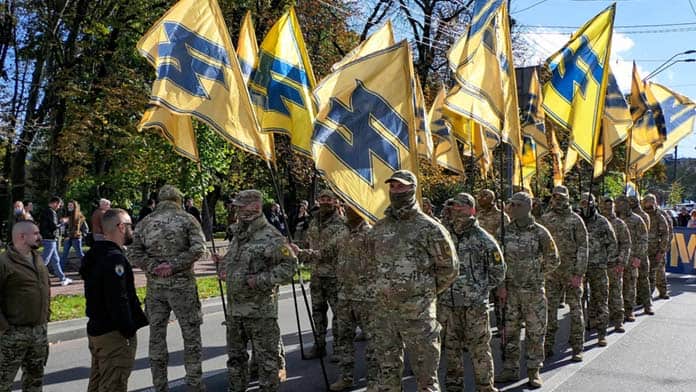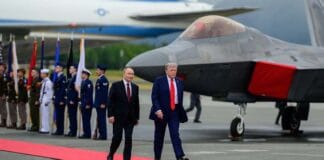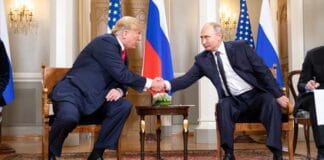When Putin announced the bloody Russian invasion of Ukraine, he said his goal was “the demilitarisation and deNazification” of that country and that “the leading NATO countries are supporting the far-right nationalists and neo-Nazis in Ukraine”.
A pro-West, pro-NATO government came to power in Ukraine following protests in 2014, which the Kremlin claims is working with the far right to exterminate Ukraine’s Russian-speaking minority, who are mainly in the east of the country.
Putin has used the defence of Russian speakers to justify annexing Crimea, supporting Russian-speaking separatists in Donetsk and Luhansk regions on Ukraine’s border with Russia and now the invasion.
Putin’s rhetoric is designed to tap into the historical memory of the Second World War and the brutal conflict with Nazi Germany. But his attempts to link the government of President Vladimir Zelensky to Nazis ignore that Zelensky is a Jew.
Ukraine has a significant Nazi and far-right nationalist movement. But before the invasion there was no evidence it enjoyed widespread support. In the 2019 Ukrainian elections a coalition of ultranationalist parties failed to win a single seat.
However, during the 2014 protests Nazis and the far right played a prominent role in street battles with the police of former President Victor Yanukovich. Following Russia’s annexation of Crimea, Nazis and far-right militias mobilised to fight Russian-backed separatists around Donetsk and Luhansk, as well as in the port city of Mariupol.
The most notorious of these ultranationalist paramilitary groups is the Azov Battalion, which cut its teeth in the 2014 protests. They became a serious military force in battles with separatists in Mariupol and gained a new legitimacy by helping drive them from the city in June 2014.
The Azov Battalion’s emblem is the Wolfsangel—the symbol of an elite division of the Nazi Waffen-SS. Its first commander was Andriy Biletsky, a leader of Nazi organisations Patriot of Ukraine and Social-National Assembly.
In 2015 a spokesperson for the regiment said up to 20 per cent of its members were Nazis. A 2016 report by the Office of the United Nations High Commissioner for Human Rights found that soldiers from the battalion had raped and killed civilians since 2014.
President Zelensky and the Azov battalion both received backing from the same oligarch; Ukrainian billionaire Igor Kolomoisky, an energy and media magnate. The Pandora papers exposed extensive offshore financial links between Zelensky, his associates and the exiled billionaire.
Despite its horrific ideology, in November 2014 the Azov Battalion was incorporated into the National Guard of Ukraine and put on the government payroll. Vadym Troyan, a former Azov deputy commander, was appointed the chief of police for the Kyiv Region from 2014 to 2021.
The Azov battalion has also received training and arms from the United States since 2014. Facebook even lifted a ban on praising the Nazi battalion when Russia invaded Ukraine in February.
Hypocrisy
The links between the Zelensky government and the far-right in Ukraine are dangerous and all too real.
And Russian speakers do face some oppression. For example, language laws passed early this year require print media outlets registered in Ukraine to publish in Ukrainian. Exceptions are made for English and official EU languages, but not Russian. There have also been cases of atrocities against Russian speakers by far-right militias.
But Putin’s claim to be liberating Russian speakers from Nazis is cynical hypocrisy. Separatist militias fighting since 2014 are overwhelmingly proxies for Russia, dependent on Russian arms and personnel.
They also have their own ties to the far right. Russian Nazi and ultranationalist groups openly mobilise and train volunteers to fight in Ukraine.
The Guardian reports: “Russian mercenaries fighting in Ukraine, including the Kremlin-backed Wagner Group, have been linked to far-right extremism including an organisation designated by the US as terrorist.”
Alexander Borodai, the first Prime Minister of the Donetsk People’s Republic, worked for the far-right Russian newspaper Zavtra. Putin has enjoyed the adoration of fascist organisations worldwide. The presidential candidate for France’s fascist National Rally, Marine Le Pen, met Putin during her presidential campaign in 2017.
The conflict in Ukraine is being driven by ruthless imperialists and thugs on both sides, fuelled by a relentless tide of government-sponsored nationalist fervour.
The West is pouring arms into Ukraine and whitewashing dangerous links between the far right and Zelensky’s government. And there are ties between the far right and pro-Putin forces within the country.
Hope doesn’t lie with backing either imperialism or their proxies but with an anti-war movement that rejects both Putin’s invasion and NATO expansion.
By Adam Adelpour






